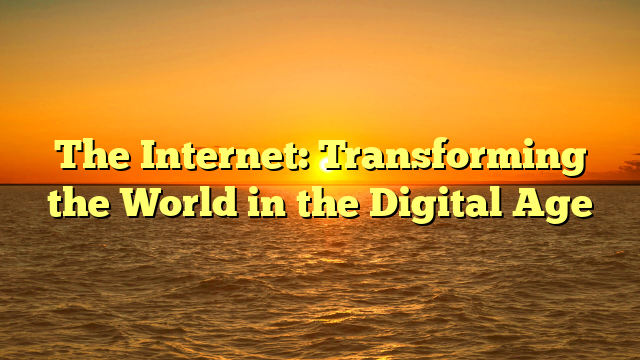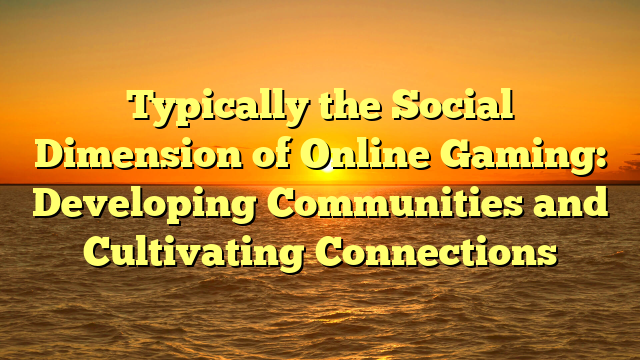
By [Your Name]
The internet stands as one of the most revolutionary inventions of the modern era, fundamentally altering how we communicate, access information, conduct business, and interact with the world around us. From its humble beginnings as a military communication network to its current status as a global information superhighway, the internet has become an integral slot pulsa part of daily life, shaping societies and economies across the globe.
A Brief History of the Internet
The origins of the internet can be traced back to the late 1960s with the development of ARPANET (Advanced Research Projects Agency Network), a project funded by the U.S. Department of Defense. ARPANET was designed to enable secure and reliable communication between research institutions and government agencies. The concept of packet switching, a method of breaking down data into smaller packets for transmission, was a fundamental innovation that made the network resilient and efficient.
Throughout the 1970s and 1980s, ARPANET expanded, incorporating more universities and research centers. The introduction of the Transmission Control Protocol/Internet Protocol (TCP/IP) in 1983 standardized data transmission, laying the groundwork for the modern internet. The creation of the World Wide Web (WWW) by Tim Berners-Lee in 1989 further revolutionized the internet by providing a user-friendly interface for accessing and sharing information.
Key Technologies that Shaped the Internet
Several key technologies have been pivotal in the development and expansion of the internet:
- World Wide Web (WWW): Introduced in 1989, the WWW made the internet accessible to the general public by allowing the creation and linking of web pages through hyperlinks. This innovation transformed the internet from a tool for researchers into a global platform for information exchange and communication.
- Browsers and Search Engines: The development of web browsers like Netscape Navigator and Internet Explorer in the 1990s, followed by modern browsers such as Chrome and Firefox, made navigating the web more intuitive. Search engines like Google revolutionized information retrieval, making it easier for users to find relevant content quickly.
- Broadband and Mobile Internet: The transition from dial-up connections to broadband in the early 2000s significantly increased internet speed and reliability. The advent of smartphones and the proliferation of mobile internet have made the internet accessible anytime and anywhere, further integrating it into daily life.
- Cloud Computing: Cloud technology has transformed how data is stored, processed, and accessed. Services like Amazon Web Services (AWS), Microsoft Azure, and Google Cloud enable businesses and individuals to utilize scalable computing resources without the need for extensive local infrastructure.
Impact of the Internet on Society
The internet’s influence permeates virtually every aspect of modern life, driving profound changes in various sectors:
Communication
The internet has revolutionized communication, making it faster, more efficient, and more accessible. Email, instant messaging, social media platforms, and video conferencing tools have replaced traditional forms of communication, enabling real-time interaction across the globe. Platforms like Facebook, Twitter, and Instagram have also become essential for personal expression and social networking.
Education
Online education has expanded access to learning opportunities, allowing individuals to pursue degrees, certifications, and courses from anywhere in the world. Massive Open Online Courses (MOOCs) offered by institutions like Coursera, edX, and Khan Academy democratize education, making high-quality resources available to a broader audience.
Commerce
E-commerce platforms such as Amazon, eBay, and Alibaba have transformed the retail landscape, providing consumers with a vast array of products and services at their fingertips. The internet has also enabled the rise of digital marketplaces, peer-to-peer transactions, and the gig economy, fundamentally changing how businesses operate and consumers shop.
Entertainment
Streaming services like Netflix, Spotify, and YouTube have redefined entertainment consumption, offering on-demand access to movies, music, and videos. The internet has also facilitated the growth of online gaming, virtual reality experiences, and user-generated content, catering to diverse entertainment preferences.
Healthcare
Telemedicine and online health resources have improved access to medical care and information. Patients can consult with healthcare professionals remotely, access medical records online, and utilize health monitoring devices connected to the internet, enhancing the efficiency and accessibility of healthcare services.
Economic Impact
The internet has been a major driver of economic growth, creating new industries and transforming existing ones. It has enabled the rise of digital startups, facilitated global trade, and provided businesses with tools for marketing, analytics, and customer engagement. The digital economy encompasses sectors such as e-commerce, digital marketing, online advertising, and software development, contributing significantly to global GDP.
Challenges and Concerns
Despite its numerous benefits, the internet presents several challenges and concerns that need to be addressed:
Privacy and Security
The vast amount of personal data shared online raises significant privacy concerns. Data breaches, identity theft, and cyberattacks are persistent threats that undermine trust in digital platforms. Ensuring robust cybersecurity measures and data protection regulations is crucial to safeguarding user information.
Digital Divide
Access to the internet is not uniform across the globe, leading to a digital divide between those with reliable internet access and those without. This disparity can exacerbate existing social and economic inequalities, limiting opportunities for education, employment, and participation in the digital economy for underserved populations.
Misinformation and Fake News
The internet facilitates the rapid spread of information, but it also enables the dissemination of misinformation and fake news. This can have serious implications for public opinion, political processes, and societal trust. Combating misinformation requires a combination of technological solutions, media literacy education, and regulatory measures.
Mental Health and Well-being
Excessive internet use and social media engagement can impact mental health, contributing to issues such as anxiety, depression, and addiction. Balancing the benefits of connectivity with the need for healthy digital habits is essential for individual well-being.
The Future of the Internet
The internet continues to evolve, driven by advancements in technology and changing user needs. Several trends are shaping the future of the internet:
Internet of Things (IoT)
The IoT connects everyday objects to the internet, enabling them to send and receive data. This interconnectedness enhances automation, efficiency, and data-driven decision-making across various sectors, including smart homes, healthcare, transportation, and industrial processes.
5G and Beyond
The rollout of 5G networks promises faster speeds, lower latency, and greater connectivity, facilitating innovations such as autonomous vehicles, augmented reality, and real-time data processing. Future advancements in network technology will continue to expand the capabilities and applications of the internet.
Artificial Intelligence (AI) Integration
AI and machine learning are increasingly integrated into internet services, enhancing personalization, automation, and data analysis. From intelligent virtual assistants to predictive analytics, AI is transforming how we interact with digital platforms and utilize online information.
Decentralization and Blockchain
Blockchain technology offers decentralized and secure methods for data storage and transactions. Its integration into the internet infrastructure has the potential to enhance security, transparency, and trust in digital interactions, with applications ranging from cryptocurrency to supply chain management.
Sustainable Internet Practices
As the internet’s infrastructure expands, so does its environmental footprint. Efforts to develop sustainable internet practices focus on reducing energy consumption, utilizing renewable energy sources for data centers, and promoting eco-friendly technologies to mitigate the environmental impact of digital growth.
Conclusion
The internet has undeniably transformed the world, revolutionizing how we communicate, learn, work, and entertain ourselves. Its continuous evolution promises even greater advancements and opportunities, while also presenting new challenges that require thoughtful solutions. As society navigates the complexities of the digital age, the internet will remain a pivotal force, shaping the future of human interaction and global development. Embracing its potential while addressing its challenges will be essential to harnessing the internet’s full capacity to drive progress and improve lives worldwide.





